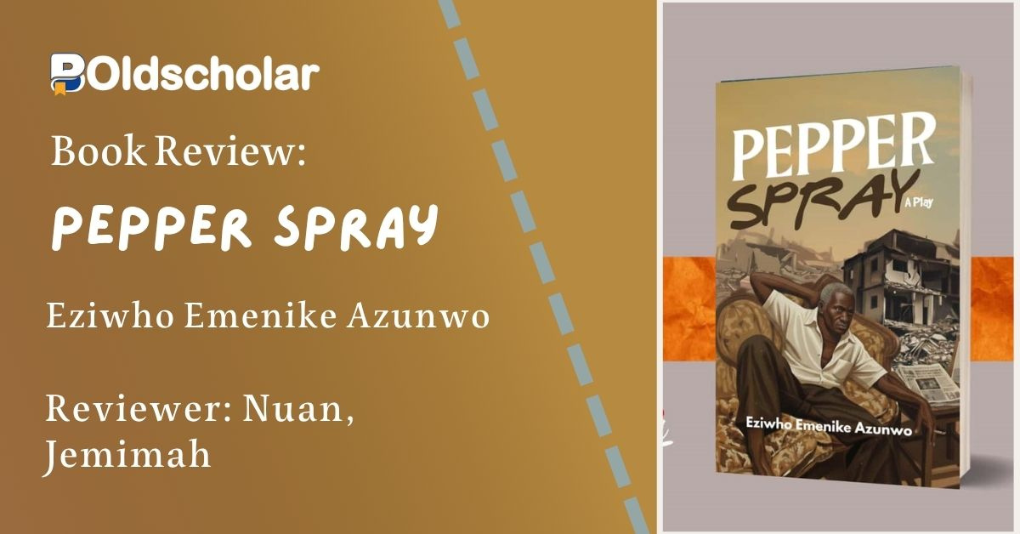Book title: Chief Gaa
Author: Adebayo Faleti’s
Yoruba drama: Bashorun Gaa
Translator: Sola Owonibi
Publisher: Rasmed Publications Limited
Year published: 2021
Pages: 136
Reviewer: Adjekpagbon Blessed Mudiaga
The translated version of Adebayo Faleti’s Yoruba drama book titled “Bashorun Gaa” to English language “Chief Gaa” by Sola Owonibi, is quite interesting. It can make any non-Yoruba person who reads it, to have insight about the rich history of old Oyo Empire. It showcases the pains and sufferings some folks went through under some personalities who thought they were God to other humans on earth in the days of yore.
One of the central characters in the story is Chief Gaa who takes power into his own hands by deposing and enthroning any person he feels should become the Alafin (King) of the former Oyo kingdom. There are many persons in modern day society that have similar character and sees themselves as demi – gods who should be worshipped as political godfathers by all and sundry.
He imposes kings at will on the people and depose or kills them as he likes. At a point, he enthrones a young man known as Abiodun, otherwise called Adegoolu as king. The new king knows the antecedents of Gaa and tries to pacify him with everything he thinks could make the diabolical chief happy. Instead of bowing for the newly enthroned king as the overall commander in chief of Oyo folks, the king bows for him for peace to reign. Yet, he still has some sinister plans up his sleeve.
Besides his arrogance of deposing and imposing any person he wants as king, his son named Olayiiotan, and nephew known as Obe, are ruthless like him. They see themselves as tin gods to the populace. Constant infliction of pains, suffering and death on the folks is what they relish and cherish as fun. These two characters in the tragic drama are the metaphors of the children of some uncultured rich people in modern times. Disorderliness is their sport, as they see themselves above the law. They do whatever they like without being punished for their wrong doings.
The recalcitrant behaviour and activities of Gaa’s two aforementioned consanguine on one hand, and his hence man known as Gbagi support for their evil machinations on the other, are some of the realities of evil still prevailing in various societies in the world at present. Money is the God of many which makes them have no regards for human life.
As the play progresses from after Adegoolu is crowned as a new king to replace the previous one in the list of multiple ones already deposed by Gaa - Chief king maker among the Oyomesi (Council of king makers), one sees a tapestry of rich African traditional proverbs and natural laws being employed by the dramatis personae in controlling both visible and invisible beings, in an ever-mysterious world. Gaa’s invincible belief that nobody can challenge his authority comes to the fore when he uses Agboyin, the king’s only child and daughter, for ritual to become more powerful and rich. This marks the beginning of his demystification.
Moreover, Akinkunmi and Samu are two characters that portrays bravery among some commoners that are ready to fight injustice in society with the last drop of their blood. Agboyin who has been in love with Akinkunmi from the onset, symbolizes the humility of some beautiful ladies that are from rich backgrounds, but do not use wealth as a yardstick to choose a man they want to marry.
In reciprocation, Akinkunmi also shows that though he is from a family considered to be worthless, the depth of love he has for Agboyin is genuine, and not because she is a princess. He has been in love with her before she suddenly acquires her new status. He is not afraid of the terror known as Gaa, as he personally goes to the dreadful terrorist of Oyo folks to challenge him for killing his lover, Agboyin. This display of love and vengeance for the death of his lover, can be likened to the type of love Romeo has for Juliet in William Shakespeare’s eponymous play titled “Romeo and Juliet.”
In addition, despite Gaa’s seeming insurmountable magical powers by any human, he meets his waterloo at the hands of Akinkunmi who hits him with a charm that paralyze him immediately. It marks the fall and disgrace of the ruthless terrorist who thinks he is above destruction.
The play however, reminds the reader about similar texts that showcase magical spells and supernatural powers in their storylines. One of such dramas is ‘Tempest,’ by William Shakespeare, in which spirits are sent on errands to perform certain duties. The scene where Gaa invokes witches to assist him when Adegoolu, Aare Kankafo (Chief Warrior of old Oyo empire), Samu and co confronts him in his own burnt house, is a pointer to the futility of charms when it is time to pay for karmic debts.
Empty praise singers of wicked people in the society is also one of the points the drama brings to the fore. It highlights how sycophants end in shame, and how they usually switch camps to where they can benefit from whoever they are praising.
By and large, the translator has done a very good job for producing the English edition of the drama for the benefit of every person that is literate in English. Though it talks about very serious and horrible issues, it is also laced with comic strips. This makes the reader chuckle at certain scenes.
Nonetheless, some typos and psychological noise needs to be corrected in some portions of the book before reprint. For instance, a graphical error where one of Iya Ile-Ori’s comments is mistakenly fused into Kudeefu’s comment at page 26, and the omission of letter ‘t’ from talk in Akinkunmi’s speech at page 74, are part of the minor errors that needs to be corrected before printing new copies.
In conclusion, the play is highly recommended for every person in the position of power and the general public, to make many understand that there is no mortal that can escape karmic debts. There is always a time for repercussions for any evil committed by tyrannical people, just as Gaa, his sons and Gbagi meet their disgraceful deaths as the play ends.
Owonibi the translator, is a Professor of English at the University of Akungba – Akoko, Ondo State, Nigeria. He is an awarding poet and playwright.
https://bulkybonnews.blogspot.com
WhatsApp: +2348059265333
Direct line: +2348067538922
Share this post





Fasehun olusesola
Obe is chief gas nephew
Obisesan Sunday Abraham
Who is OBE to Gaa ? He is a child or nephew ?